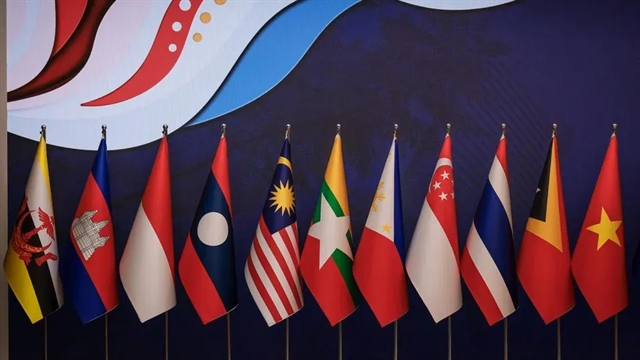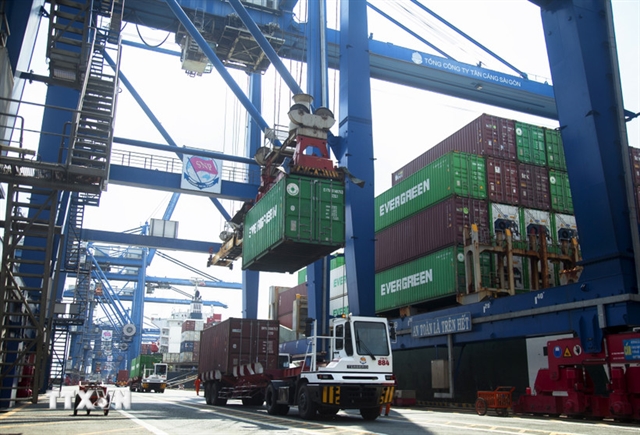 World
World

.jpg)
|
| A view of a reception point for Ukrianinian refugees established at former shopping mall in Chelm, southeastern Poland, on Tuesday. Since February 24, when Russia attacked Ukraine, around 2.96 million people have crossed the Polish-Ukrainian border into Poland, the Polish Border Guard has reported on Tuesday morning. — PAP/VNA Photo |
MOSCOW — Russian President Vladimir Putin told the visiting UN chief on Tuesday that he still had hope for negotiations to end the conflict in Ukraine.
"Despite the fact that the military operation is ongoing, we still hope that we will be able to reach agreements on the diplomatic track," Putin told UN Secretary-General Antonio Guterres, who was visiting Moscow, in televised remarks.
"We are negotiating, we do not reject (talks)."
Sitting across from Guterres at a long table at the Kremlin, Putin said efforts at talks with Ukraine had been derailed by claims of atrocities committed by Russian forces in the town of Bucha outside Kyiv.
"There was a provocation in the village of Bucha, which the Russian army had nothing to do with," Putin said. "We know who prepared this provocation, by what means, and what kind of people worked on it."
Ukraine had proposed an international agreement whereby other countries would guarantee its security. In return, Kyiv would not join NATO or host foreign military bases and become a neutral, non-nuclear state.
The talks in Turkey stalled after the discovery of civilian bodies in areas near Kyiv previously occupied by Russian forces.
Putin told Guterres he was "aware of your concerns about Russia's military operation" in Ukraine and ready to discuss it, but blamed the turmoil in the country on an "anti-state coup" that overturned a pro-Russian president in 2014.
Guterres reiterated his call from an earlier meeting with Foreign Minister Sergei Lavrov for Moscow and Kyiv to work together with the UN to set up aid and evacuation corridors to help civilians in Ukraine.
The UN chief's spokesman Stephane Dujarric said Putin agreed "in principle" to the United Nations and the International Committee of the Red Cross being involved in evacuating civilians from the Azovstal steelworks in the port city of Mariupol.
Further discussions will take place between the UN Office for the Coordination of Humanitarian Affairs and the Russian defence ministry, he added.
Moldova blasts
Concerns that the Ukraine war could escalate into a wider conflict grew on Tuesday as Kyiv accused Moscow of trying to create unrest in a Russian-backed separatist region of Moldova.
The United Nations and United States warned of rising tensions in the Transnistria region of Moldova, as UN chief Guterres met with Russian President Putin in Moscow and pleaded for peace.
Russian forces have been in Transnistria for decades after the predominantly Russian-speaking region seceded from the former Soviet republic.
Blasts this week targeting the state security ministry, a radio tower and military unit came after a Russian commander claimed Russian speakers in Moldova were being oppressed.
Guterres "is following with concern reports of new security incidents in the Transnistrian region of Moldova", a UN spokesman said.
The United States echoed similar concerns.
"We fully support Moldova's territorial integrity and sovereignty," State Department spokesman Ned Price told reporters.
Arms flow into Ukraine
Ukraine's President Volodymyr Zelensky has been lobbying for heavier firepower to push back the Russian advance now focused on the eastern region of Donbas.
Western allies are wary of being drawn into an outright war with Russia, but Washington pledged on Tuesday at a summit to move "heaven and earth" to enable Ukraine to emerge victorious.
"Ukraine clearly believes that it can win and so does everyone here," US Defence Secretary Lloyd Austin told 40 allies gathered at the Ramstein Air Base in Germany.
With arms flowing into Ukraine, Germany announced on Tuesday it would send anti-aircraft tanks – a sharp U-turn dropping its much-criticized cautious stance.
"I can say one thing: the Ukrainian army will have something to fight with," Dmytro Kuleba, Ukraine's foreign minister, said in a briefing on Facebook.
"We have entered a completely new phase.... But this is just the beginning. Much more will come to us."
The Ukrainian defence ministry reported in its latest update that fighting was raging across the east with shelling of Kharkiv city and Russian troops launching an offensive on the town of Barvinkove near Izium.
At the entrance to Barvinkove, not far from the Russian lines, six Ukrainian soldiers were ready at any moment to dive into their trench, which they dig every day with a shovel.
Ukraine officials said there was fighting all along frontlines in the Donetsk region, and that resistance in the Azovstal factory in the besieged port city of Mariupol was still holding out.
Civilians flee
Russia said it had carried out high-precision missile strikes against 32 Ukrainian military targets including four ammunition depots on Tuesday. It also launched airstrikes against 33 targets and 100 artillery and rocket strikes.
In the south, two Russian missiles struck the industrial city of Zaporizhzhia, which has welcomed many civilians fleeing Mariupol, regional authorities said.
Russian forces are expected to soon advance on the city, giving them the potential to seize Ukraine's largest nuclear power plant.
Strikes on Tuesday killed at least nine civilians in the south and east, Ukrainian officials said.
The UN's refugee agency said it now expects more than eight million Ukrainians to eventually flee their country, with nearly 5.3 million already out, and that US$1.85 billion would be needed to host them in neighbouring countries, mainly Poland. — AFP